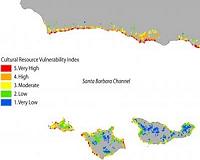| . |  |
. |
Barcelona, Spain (SPX) Nov 05, 2010 The Atlantic Ocean circulation (termed meridional overturning circulation, MOC) is an important component of the climate system. Warm currents, such as the Gulf Stream, transport energy from the tropics to the subpolar North Atlantic and influence regional weather and climate patterns. Once they arrive in the North the currents cool, their waters sink and with them they transfer carbon from the atmosphere to the abyss. These processes are important for climate but the way the Atlantic MOC responds to climate change is not well known yet. An international team of investigators under the leadership of two researchers from the UAB now demonstrates the response of the Atlantic MOC to climate change in the past. The new research results will be published on 4 November 2010 in the international front-line journal NATURE. The research project was led by Rainer Zahn (ICREA researcher) and Pere Masque, both of the UAB at the Institut de Ciencia i Tecnologia Ambientals (ICTA) and Department of Physics. With collaborators at the universities of Seville, Oxford and Cardiff (UK) they investigated the distribution of isotopes in the Atlantic Ocean that are generated from the natural decay of uranium in seawater and are distributed with the flow of deep waters across the Atlantic basin. The young investigator Cesar Negre studied the natural abundance of these isotopes in the seafloor sediments 2.5 km deep in the South Atlantic and achieved a PhD degree in the Environmental Science and Technology doctoral programme at ICTA. The study shows that the ocean circulation was very different in the past and that there was a period when the flow of deep waters in the Atlantic was reversed. This happened when the climate of the North Atlantic region was substantially colder and deep convection was weakened. At that time the balance of seawater density between the North and South Atlantic was shifted in such a way that deep water convection was stronger in the South Polar Ocean. Recent computer models simulate a reversal of the deep Atlantic circulation under such conditions while it is only now with the new data generated by UAB scientists and their colleagues from Seville and the UK that the details of the circulation reversal become apparent. This situation occurred during the ice age 20,000 years ago. Although this was far back in time the results are relevant for our climate today and in the near future. The new study shows that the Atlantic MOC in the past was very sensitive to changes in the salt balance of Atlantic Ocean currents. Similar changes in seawater salt concentration are expected to occur in the North Atlantic in the course of climate warming over the next 100 years. Therefore the data to be published in Nature offer the climate modelling community the opportunity to calibrate their models and improve their capacity to predict reliably future ocean and climate changes.
Share This Article With Planet Earth
Related Links Universitat Autonoma de Barcelona Water News - Science, Technology and Politics
 Archaeological Sites Threatened By Rising Seas
Archaeological Sites Threatened By Rising SeasWashington DC (SPX) Nov 03, 2010 Should global warming cause sea levels to rise as predicted in coming decades, thousands of archaeological sites in coastal areas around the world will be lost to erosion. With no hope of saving all of these sites, archaeologists Torben Rick from the Smithsonian Institution, Leslie Reeder of Southern Methodist University, and Jon Erlandson of the University of Oregon have issued a call to ... read more |
|
| The content herein, unless otherwise known to be public domain, are Copyright 1995-2010 - SpaceDaily. AFP and UPI Wire Stories are copyright Agence France-Presse and United Press International. ESA Portal Reports are copyright European Space Agency. All NASA sourced material is public domain. Additional copyrights may apply in whole or part to other bona fide parties. Advertising does not imply endorsement,agreement or approval of any opinions, statements or information provided by SpaceDaily on any Web page published or hosted by SpaceDaily. Privacy Statement |